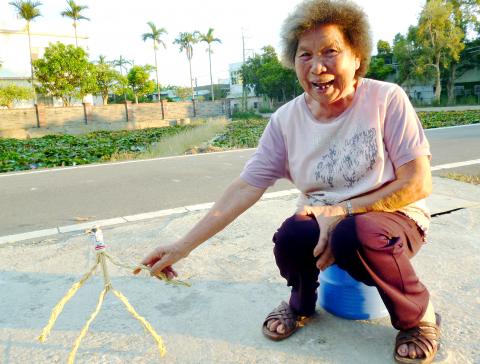While many may feel a certain discomfort around straw figures used in Taoist ceremonies to dispel bad luck or drive away evil spirits — especially during the seventh month of the lunar calendar, which is traditionally known as Ghost Month — Chien Hsu Ming-hsia (簡許明霞), an 85-year-old grandmother in Taoyuan County’s Guanyin Township (觀音), has made a career out of it.
In Chinese tradition, Ghost Month is a period during which the spirits of the dead are allowed back into the mortal world, and it is customary for people to give offerings of food and drink to the spirits so their time is enjoyable and they are not inclined to disrupt human life.
According to the township’s cultural and historical academic Lin Hsin-lai (林新來), local lore recounts many rituals that used straw effigies, including those to dispel bad luck, counter evil spirits, end bad romances and even lift curses.

Photo: Lee Jung-ping, Taipei Times
Usually a Taoist master needs a lock of hair or fingernail clippings from the person plagued by evil spirits.
These are put into a straw figure along with a paper slip, on which the birth time and date and name of the person is written, Lin said.
Once the slip is put into the figure it becomes a “simulacrum” of the person, Lin said.
Chien Hsu said she learned how to make the effigies 15 years ago and has been making them for out-of-town temples ever since.
Years of experience have made her a deft hand at effigy making. She can make about 10 effigies per hour — which works out to about 1,000 a month and a total of 170,000 over the course of 15 years.
There are specific dimensions and standards to meet when making the effigies, Chien Hsu said, adding that each figure is made from 36 pieces of straw, nine of which go to fashion the head, nine each for the arms and hands, nine for the body and nine each for the legs.
Her children, two boys and five girls, said they used to feel slightly spooked when they saw the straw figures at home.
However, now they try to see their mother’s craft from a different perspective.
“The effigies are said to ward off ill luck, so it should be something akin to doing good,” they said.

US climber Alex Honnold is to attempt to scale Taipei 101 without a rope and harness in a live Netflix special on Jan. 24, the streaming platform announced on Wednesday. Accounting for the time difference, the two-hour broadcast of Honnold’s climb, called Skyscraper Live, is to air on Jan. 23 in the US, Netflix said in a statement. Honnold, 40, was the first person ever to free solo climb the 900m El Capitan rock formation in Yosemite National Park — a feat that was recorded and later made into the 2018 documentary film Free Solo. Netflix previewed Skyscraper Live in October, after videos

Starting on Jan. 1, YouBike riders must have insurance to use the service, and a six-month trial of NT$5 coupons under certain conditions would be implemented to balance bike shortages, a joint statement from transportation departments across Taipei, New Taipei City and Taoyuan announced yesterday. The rental bike system operator said that coupons would be offered to riders to rent bikes from full stations, for riders who take out an electric-assisted bike from a full station, and for riders who return a bike to an empty station. All riders with YouBike accounts are automatically eligible for the program, and each membership account

NUMBERS IMBALANCE: More than 4 million Taiwanese have visited China this year, while only about half a million Chinese have visited here Beijing has yet to respond to Taiwan’s requests for negotiation over matters related to the recovery of cross-strait tourism, the Tourism Administration said yesterday. Taiwan’s tourism authority issued the statement after Chinese-language daily the China Times reported yesterday that the government’s policy of banning group tours to China does not stop Taiwanese from visiting the country. As of October, more than 4.2 million had traveled to China this year, exceeding last year. Beijing estimated the number of Taiwanese tourists in China could reach 4.5 million this year. By contrast, only 500,000 Chinese tourists are expected in Taiwan, the report said. The report

Temperatures are forecast to drop steadily as a continental cold air mass moves across Taiwan, with some areas also likely to see heavy rainfall, the Central Weather Administration (CWA) said. From today through early tomorrow, a cold air mass would keep temperatures low across central and northern Taiwan, and the eastern half of Taiwan proper, with isolated brief showers forecast along Keelung’s north coast, Taipei and New Taipei City’s mountainous areas and eastern Taiwan, it said. Lows of 11°C to 15°C are forecast in central and northern Taiwan, Yilan County, and the outlying Kinmen and Lienchiang (Matsu) counties, and 14°C to 17°C